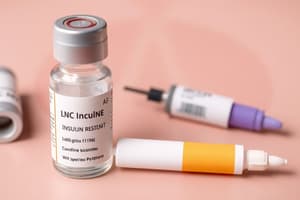Podcast
Questions and Answers
What is the main action of glyburide?
What is the main action of glyburide?
- Reduces hepatic glucose production
- Stimulates the kidneys to concentrate urine
- Inhibits the release of thyroid hormone
- Stimulates the beta cells to release insulin (correct)
What is the main indication for Desmopressin (DDAVP)?
What is the main indication for Desmopressin (DDAVP)?
- Diabetes Insipidus (correct)
- Hypothyroidism
- Type 2 diabetes
- Hyperparathyroidism
What is the main action of Calcitonin-salmon (Miacalcin)?
What is the main action of Calcitonin-salmon (Miacalcin)?
- Stimulates insulin release
- Inhibits parathyroid hormone secretion
- Synthetic Thyroid Hormone (correct)
- Reduces glucose absorption
What is the main side effect of Metformin?
What is the main side effect of Metformin?
What is the main action of Acarbose (Precose)?
What is the main action of Acarbose (Precose)?
What is the main indication for Potassium Iodide?
What is the main indication for Potassium Iodide?
What is the main action of Levothyroxine (T4)?
What is the main action of Levothyroxine (T4)?
What is a common adverse reaction of Desmopressin (DDAVP)?
What is a common adverse reaction of Desmopressin (DDAVP)?
What is a contraindication for Calcitonin-salmon (Miacalcin)?
What is a contraindication for Calcitonin-salmon (Miacalcin)?
What is a nursing implication for Metformin?
What is a nursing implication for Metformin?
Which cardiac drug mimics Epinephrine and Norepinephrine?
Which cardiac drug mimics Epinephrine and Norepinephrine?
What are the nursing implications for Warfarin Sodium?
What are the nursing implications for Warfarin Sodium?
What is the antidote for Warfarin Sodium overdose?
What is the antidote for Warfarin Sodium overdose?
Which drug is an Angiotensin Converting Enzyme Inhibitor (ACE-I)?
Which drug is an Angiotensin Converting Enzyme Inhibitor (ACE-I)?
What is the action of Simvastatin (Zocor)?
What is the action of Simvastatin (Zocor)?
Which drug reduces sympathetic excitation in the heart and slows down the heart rate?
Which drug reduces sympathetic excitation in the heart and slows down the heart rate?
What is the primary action of Diltiazem (Cardizem) as a calcium channel blocker?
What is the primary action of Diltiazem (Cardizem) as a calcium channel blocker?
Which drug is an anticoagulant that interferes with fibrinogen conversion into fibrin?
Which drug is an anticoagulant that interferes with fibrinogen conversion into fibrin?
In the context provided, which drug is used to prevent clot formation in deep vein thrombosis or pulmonary embolism?
In the context provided, which drug is used to prevent clot formation in deep vein thrombosis or pulmonary embolism?
Which drug class does Andrenalick belong to?
Which drug class does Andrenalick belong to?
Which drug is administered at a 90-degree angle in the lower quadrants of the abdomen?
Which drug is administered at a 90-degree angle in the lower quadrants of the abdomen?
What is the antidote for heparin?
What is the antidote for heparin?
Which drug is a calcium channel blocker that blocks Ca uptake by myocardial cells?
Which drug is a calcium channel blocker that blocks Ca uptake by myocardial cells?
What is the primary action of guaifenesin?
What is the primary action of guaifenesin?
Which drug acts by relaxing the smooth muscle of the bronchi?
Which drug acts by relaxing the smooth muscle of the bronchi?
What is the primary adverse effect of diphenhydramine?
What is the primary adverse effect of diphenhydramine?
Which medication is classified as a first-generation antihistamine?
Which medication is classified as a first-generation antihistamine?
What is the action of phenylephrine?
What is the action of phenylephrine?
Which drug acts by blocking histamine at H1 receptors?
Which drug acts by blocking histamine at H1 receptors?
What is the primary action of acetylcysteine?
What is the primary action of acetylcysteine?
What is the primary mechanism of action of Glyburide in stimulating insulin release?
What is the primary mechanism of action of Glyburide in stimulating insulin release?
What is the primary indication for Desmopressin (DDAVP)?
What is the primary indication for Desmopressin (DDAVP)?
What is a common adverse reaction of Metformin?
What is a common adverse reaction of Metformin?
What is the primary action of Calcitonin-salmon (Miacalcin)?
What is the primary action of Calcitonin-salmon (Miacalcin)?
What is a nursing implication for Glyburide?
What is a nursing implication for Glyburide?
What is the primary action of Levothyroxine (T4)?
What is the primary action of Levothyroxine (T4)?
What is a common adverse reaction of Desmopressin (DDAVP)?
What is a common adverse reaction of Desmopressin (DDAVP)?
What is the primary indication for Potassium Iodide?
What is the primary indication for Potassium Iodide?
What is a nursing implication for Calcitonin-salmon (Miacalcin)?
What is a nursing implication for Calcitonin-salmon (Miacalcin)?
What is the primary action of Acarbose (Precose)?
What is the primary action of Acarbose (Precose)?
What is the indication for Nitroglycerin?
What is the indication for Nitroglycerin?
What is the action of Amlodipine?
What is the action of Amlodipine?
What is a common side effect of Guaifenesin?
What is a common side effect of Guaifenesin?
What is the action of Acetylcysteine?
What is the action of Acetylcysteine?
What is a common side effect of Albuterol?
What is a common side effect of Albuterol?
What is the action of Theophylline?
What is the action of Theophylline?
What is a common side effect of Diphenhydramine?
What is a common side effect of Diphenhydramine?
What is the action of Phenylephrine?
What is the action of Phenylephrine?
What is a common side effect of Triamcinolone?
What is a common side effect of Triamcinolone?
What is the action of Loratadine?
What is the action of Loratadine?
What is the antidote for heparin overdose?
What is the antidote for heparin overdose?
What is the primary action of Enalapril Maleate?
What is the primary action of Enalapril Maleate?
What is the action of Digoxin?
What is the action of Digoxin?
What is the primary indication for Metoprolol?
What is the primary indication for Metoprolol?
What is the primary action of Simvastatin?
What is the primary action of Simvastatin?
What is the primary indication for Enoxaparin?
What is the primary indication for Enoxaparin?
What is the primary action of Diltiazem?
What is the primary action of Diltiazem?
What is the primary indication for Warfarin Sodium?
What is the primary indication for Warfarin Sodium?
What is the primary action of Epinephrine?
What is the primary action of Epinephrine?
What is the primary indication for Digoxin?
What is the primary indication for Digoxin?
What is the primary action of Enalapril Maleate in terms of blood pressure?
What is the primary action of Enalapril Maleate in terms of blood pressure?
Flashcards are hidden until you start studying
Study Notes
Here are the study notes:
Endocrine Drugs
- Glyburide (Diabeta)
- Stimulates beta cells to release insulin
- Effective, but decreases in effectiveness over time
- Adverse reactions: hypoglycemia, anorexia, N&V, heartburn, weight gain, weakness, numbness of extremities, heart and blood vessel disease, fetal abnormality, disulfiram (Antabuse) like reaction, hepatotoxicity, photosensitivity
- Nursing implications: take 30 minutes before breakfast, check for sulfa allergy, recognize hypoglycemia and treatment
- Desmopressin (DDAVP)
- Stimulates kidneys to concentrate urine
- Indications: Diabetes Insipidus, post-operative abdominal distention, dispel gas interfering with X-rays, Enuresis
- Adverse reactions: hypersensitivity, tremors, vertigo, sweating, belching, N&V, diarrhea, water intoxication, spasms, thrombosis
- Nursing implications: monitor for signs of hydration/dehydration, record I&O, urine SG, skin turgor, weight, lab tests, and EKG
- Calcitonin (Miacalcin)
- Synthetic thyroid hormone for hyperparathyroidism
- Indications: hypersecretion of parathyroid hormone, osteoporosis
- Adverse effects: N&V, muscle twitching, tetany, headaches, allergy, injection site irritation, hypocalcemia
- Nursing implications: allergy testing, reconstitute and use immediately, store in refrigerator, and monitor for hypocalcemia
- Metformin (Glucophage, Riomet, Fortamet, Glumetza)
- Reduces hepatic glucose production, increases insulin sensitivity
- Side effects: decreased weight, improved lipid levels
- Adverse effects: GI upset, bloating, N&V, cramping, diarrhea, metallic taste, hypoglycemia, and lactic acidosis
- Caution: liver, kidney disease, and excess alcohol
- Acarbose (Precose)
- Delays carbohydrate digestion and absorption
- Take at first bite of meal
- Adverse reactions: GI upset, bloating, flatulence, abdominal pain, diarrhea, hypoglycemia
- Caution: liver and bowel disease
- Potassium Iodide (Precose, Thyroshield, Thyrosafe, Iostat)
- Reduces vascularity of the thyroid gland
- Indications: 7-10 days before surgery, mild or severe thyroid hyperactivity in the young
- Onset: 24 hours, peak: 10-15 days
- Adverse reactions: iodism, metallic taste, fever, rash, parotitis, increased salivation, and allergic reaction
- Nursing implications: check for allergy to seafood and iodine, dilute in milk, water, or fruit juice, and minimize GI toxicity
- Levothyroxine (T4) (ThyroSAFE, ThyroSHIELD, IOSTAT, SYNTHROID)
- Increases metabolic rate by replacing thyroid hormone T4 and T3
- Indication: hypothyroidism replacement therapy
- Objective: return patient to a euthyroid state
- Adverse reactions: signs of hyperthyroidism, increased BMR
- Nursing implications: start with low dose, take at the same time every day, early AM before breakfast, record apical pulse, and monitor for improvement in 10-14 days
Cardiac Drugs
-
Epinephrine (Andrenalin, Adrenalick, EpiPen)
- Mimics epinephrine, norepinephrine
- Increases heart rate, force of contraction
- Indications: shock (ICU patient)
- Nursing implications: dilute in 250-500 mL, multi-lumen catheter, large vein, dose mcg/kg/min, titrate B/P parameters, and cardiac monitoring
-
Warfarin Sodium (Coumadin, Jantoven)
- Prevents synthesis of vitamin K
- Inhibits clot formation
- Drug of choice for long-term control
- Onset: 24 hours, optimal effect: 2-7 days
- Dose: 2-15 mg/day, based on PT and INR
- Antidote: vitamin K
-
Enalapril Maleate (Vasotec)
- Inhibits ACE from converting angiotensin I into angiotensin II
- Indications: HTN, CHF
- Adverse reactions: dry cough, hyperkalemia, leukopenia, abnormal taste perception, hypotension, headache, angioedema
-
Simvastatin (Zocor)
- Interferes with cholesterol synthesis
- Adverse effects: abdominal pain, flatulence, constipation, muscle pain, headache, dizziness, insomnia, lens opacity, cardiac arrhythmia
- Daily dose given in the evening
-
Digoxin (Lanoxin)
- Indication: atrial fibrillation
- Monitor apical heart rate
- Patient education: pulse rate
- Assess B/P before each dose
- Know med parameters for holding drugs
- PO: take with full glass of water
- Monitor: electrolytes, liver and kidney function, intake and output, and space drugs at equal intervals
-
Metoprolol (Lopressor, Toprol XL)
- Reduces sympathetic excitation in the heart
- Blocks cardiac cell response to epinephrine
- Blocks beta receptors
- Indications: SVT, ventricular arrhythmias
- Adverse reactions: GI, resp, cardiac, endocrine, reproductive, circulatory, neuro, skin, and mood
- Nursing implications: monitor for peripheral circulation, BS levels, and signs of CHF
-
Diltiazem (Cardizem)
- Blocks Ca uptake by myocardial cells
- Adverse reactions: GI, flu-like symptoms, skin, cardiac, circulatory, and neuro
-
Enoxaparin (Lovenox)
- Inhibits clot formation
- Prevents DVT or PE
- Interferes with fibrinogen conversion into fibrin
- Drug of choice for initial anticoagulant therapy in acute conditions
- Intravenous: IVP, IV infusion
- Titrated objective: APTT or PTT
- Onset action: 3-5 hours
- Advantage: less expensive, infrequent coagulation studies, and decreased bleeding
- Adverse effects: bleeding, hypersensitivity
-
Nitroglycerin (Nitro-Bid, Nitrostat)
- Indication: angina pectoris
- Action: opens coronary blood vessels, decreases cardiac workload, decreases cardiac oxygen consumption
- Adverse effects: 3H's, dizziness, orthostatic hypotension, nausea, vomiting, eczema-like skin eruptions, and rash
-
Amlodipine (Norvasc)
- Calcium channel blocker
- Action: blocks Ca uptake by myocardial cells
- Adverse effects: GI, flu-like symptoms, skin, cardiac, circulatory, and neuro### Respiratory System Drugs
-
Guaifenesin (Mucinex) is an expectorant that reduces the viscosity of mucous, making it easier to expel sputum.
-
It is an indirect acting drug that causes irritation, leading to an increase in bronchial secretions.
-
Side effects of Guaifenesin include hypersensitivity, gastrotoxicity, and drowsiness.
-
Nursing implications for Guaifenesin include positioning the patient in high Fowler's, increasing fluids, humidification, and suction as needed.
Acetylcysteine (Acetadote, Cetylev)
- Acetylcysteine is a mucolytic that breaks down thick, tenacious secretions.
- Side effects of Acetylcysteine include nausea, vomiting, stomatitis, and bronchospasm.
- Nursing implications for Acetylcysteine include teaching patients how to use an inhaled medication, administering it through inhalation or nebulizer, and mixing the liquid form with cola or fruit juice.
Albuterol (Accuneb, ProAir, Vospiire ER)
- Albuterol is a short-acting beta 2 agonist that stimulates beta 2 receptor sites, dilating the bronchi.
- Side effects of Albuterol include CNS stimulation, cardiac stimulation, gastrotoxicity, and hypoglycemia.
- Prolonged use of Albuterol can lead to tolerance.
Theophylline (Elixophyllin)
- Theophylline is a methylxanthine that relaxes the smooth muscle of the bronchi, increasing the bronchiole lumen size.
- Side effects of Theophylline include nausea, vomiting, anorexia, hypotension, and CNS stimulation.
- Caution should be exercised when consuming foods with xanthine (stimulants) such as cola, coffee, chocolate, and charcoal.
- Drug interactions with Theophylline include increased toxicity with Allopurinol, Erythromycin, and Cimetidine, and decreased effectiveness with Anticonvulsants.
Diphenhydramine (Benadryl)
- Diphenhydramine is a first-generation antihistamine that blocks histamine at H1 receptors.
- Side effects of Diphenhydramine include drying, drowsiness, hypotension, gastrotoxicity, hypersensitivity, photosensitivity, and paradoxical excitement.
- Nursing implications for Diphenhydramine include taking it with food, administering it through deep IM injection, and stopping it 4 days prior to allergy testing.
Phenylephrine (Neo-Synephrine)
- Phenylephrine is a nasal decongestant that drains the sinus cavity.
- Side effects of Phenylephrine include systemic and CNS stimulation, cardiac stimulation, gastrotoxicity, and rebound congestion.
Triamcinolone (Nasal Decongestant - Corticosteroid)
- Triamcinolone is a corticosteroid that decreases the formation of mucous and swelling.
- Side effects of Triamcinolone include systemic and CNS stimulation, cardiac stimulation, gastrotoxicity, and rebound congestion.
Loratadine (Claritin)
- Loratadine is a second-generation antihistamine that blocks histamine at H1 receptors.
- Side effects of Loratadine include drying, drowsiness, hypotension, gastrotoxicity, and hypersensitivity.
Studying That Suits You
Use AI to generate personalized quizzes and flashcards to suit your learning preferences.




